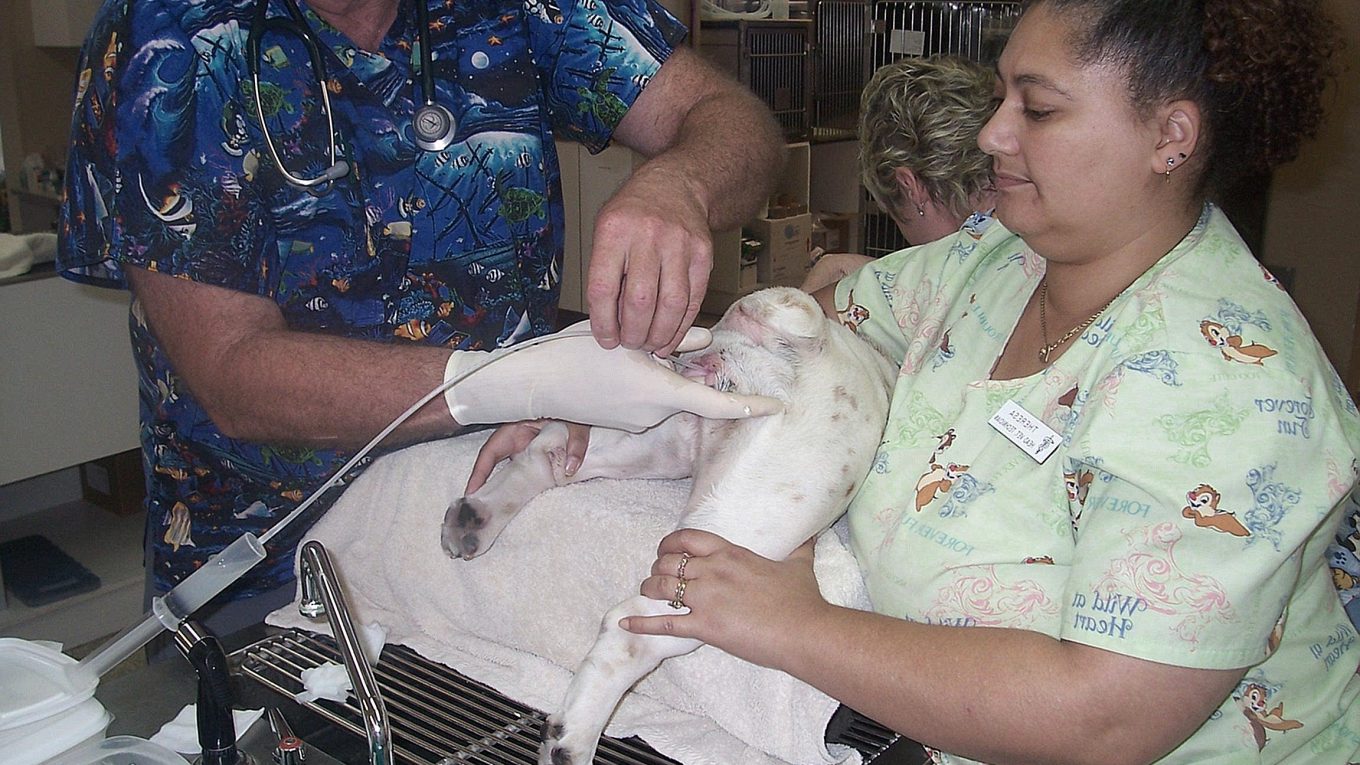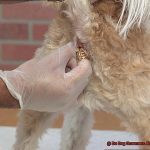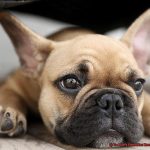Do Bulldogs Have To Be Artificially Inseminated?
Have you ever wondered if Bulldogs need a little extra help in the baby-making department?
These adorable wrinkly-faced canines have captured the hearts of many, but their unique appearance has led to questions about their reproductive abilities. Do Bulldogs require artificial insemination to bring new puppies into the world?
Get ready to uncover the truth behind this intriguing phenomenon as we explore how Bulldogs reproduce and shed light on their methods of propagation.
Do Bulldogs have to be artificially inseminated
Contents
- 1 Do Bulldogs have to be artificially inseminated
- 2 Understanding the Physical Structure of Bulldogs
- 3 Challenges Associated with Natural Breeding in Bulldogs
- 4 What is Artificial Insemination?
- 5 Benefits of Artificial Insemination for Bulldogs
- 6 Selecting the Best Genetic Matches for Bulldogs
- 7 How Artificial Insemination Improves the Health and Conformation of the Breed
- 8 When Is Natural Breeding Possible in Bulldogs?
- 9 Consulting a Veterinarian Experienced in Bulldog Reproduction
- 10 Conclusion
Breeding Bulldogs can be a complex process due to their unique physical characteristics. Bulldogs, including French Bulldogs, have a short snout and a stocky build, which can pose challenges during mating. In this blog post, we will explore why artificial insemination is often necessary for Bulldogs to successfully breed and the benefits it offers for both breeders and the breed itself.
The Difficulty of Natural Mating:
Bulldogs face difficulties in achieving successful natural mating due to their physical structure.
The male Bulldog’s short stature and limited mobility make it challenging for them to mount the female and achieve proper positioning for successful mating.
Additionally, the female Bulldog’s narrow birth canal and abnormal reproductive anatomy can contribute to difficulties in conceiving through natural mating.
Overcoming Challenges with Artificial Insemination:
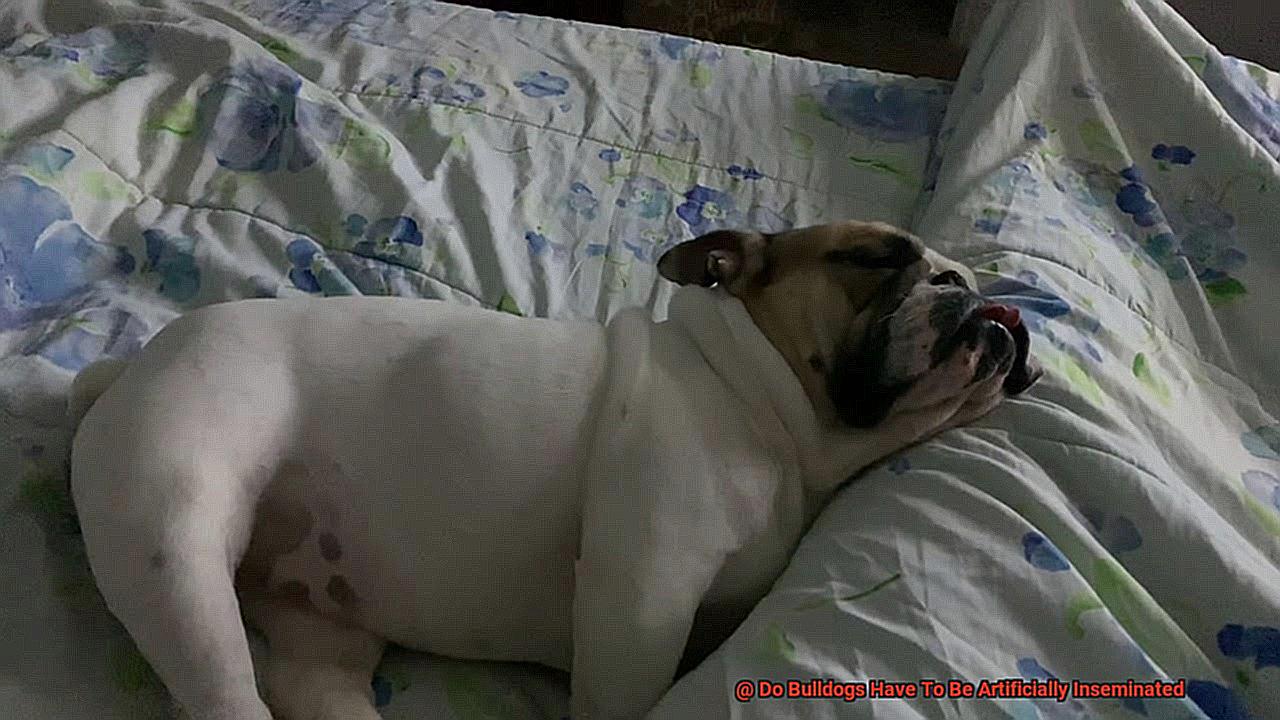
Artificial insemination is a common practice in Bulldog breeding as it provides a reliable solution to overcome the challenges associated with natural mating. It involves manually introducing semen into the female Bulldog’s reproductive tract, ensuring successful fertilization.
Addressing Reproductive Issues:
Bulldogs may experience reproductive issues such as poor sperm quality or quantity, making natural conception more difficult. Artificial insemination allows breeders to overcome these issues by using high-quality semen from carefully selected donors, increasing the chances of successful fertilization.
Small Litter Sizes:
Bulldogs typically have smaller litter sizes compared to other breeds, which can be challenging for breeders. Artificial insemination helps optimize the chances of conception and increase litter size, ensuring successful breeding outcomes.
Access to Genetic Material:
Artificial insemination techniques enable breeders to access a wider range of genetic material by using frozen or chilled semen from distant or deceased males. This expands the gene pool and allows for the preservation and propagation of desirable traits in the Bulldog breed.
Health Benefits:
Artificial insemination reduces the risks associated with natural mating, such as injuries or trauma to both the male and female Bulldogs. This procedure minimizes stress and ensures a safer breeding experience.
Understanding the Physical Structure of Bulldogs
With their adorable pushed-in noses and stocky bodies, they truly are a breed like no other. But did you know that their unique physical structure can pose challenges when it comes to natural mating? Fear not, for artificial insemination comes to the rescue, allowing breeders to overcome these hurdles and ensure successful reproduction. In this article, we will explore the physical structure of Bulldogs and how it affects their ability to mate naturally, while shedding light on the wonders of artificial insemination.
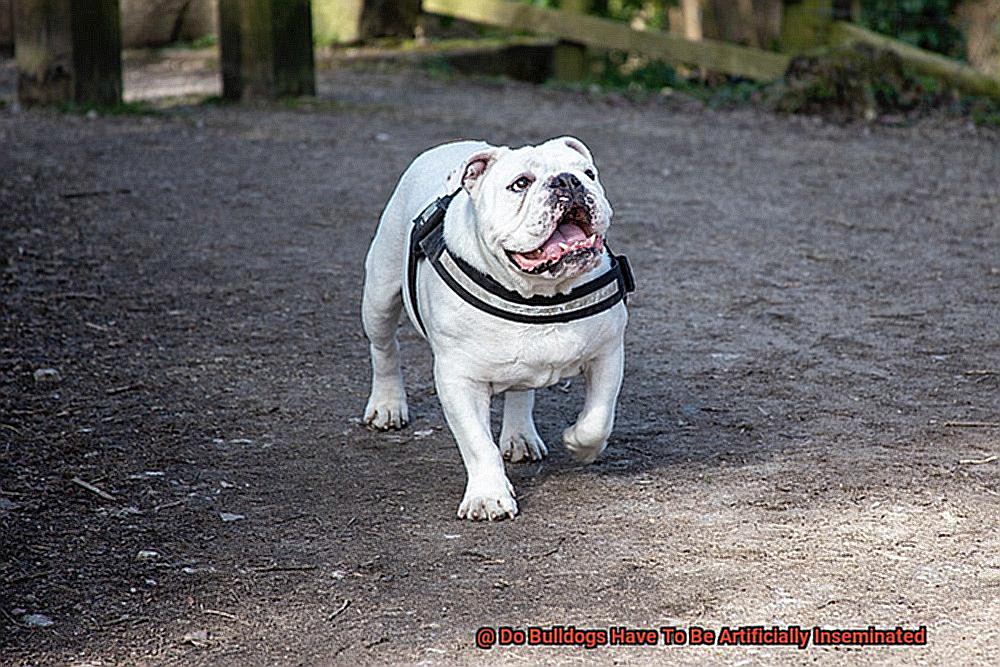
The Bulldog’s Facial Marvel:
One cannot help but fall in love with the Bulldog’s distinctive face. The brachycephalic muzzle, or pushed-in nose, is an endearing feature. However, this facial structure can lead to breathing difficulties and temperature sensitivity, making natural mating a challenge for male Bulldogs.
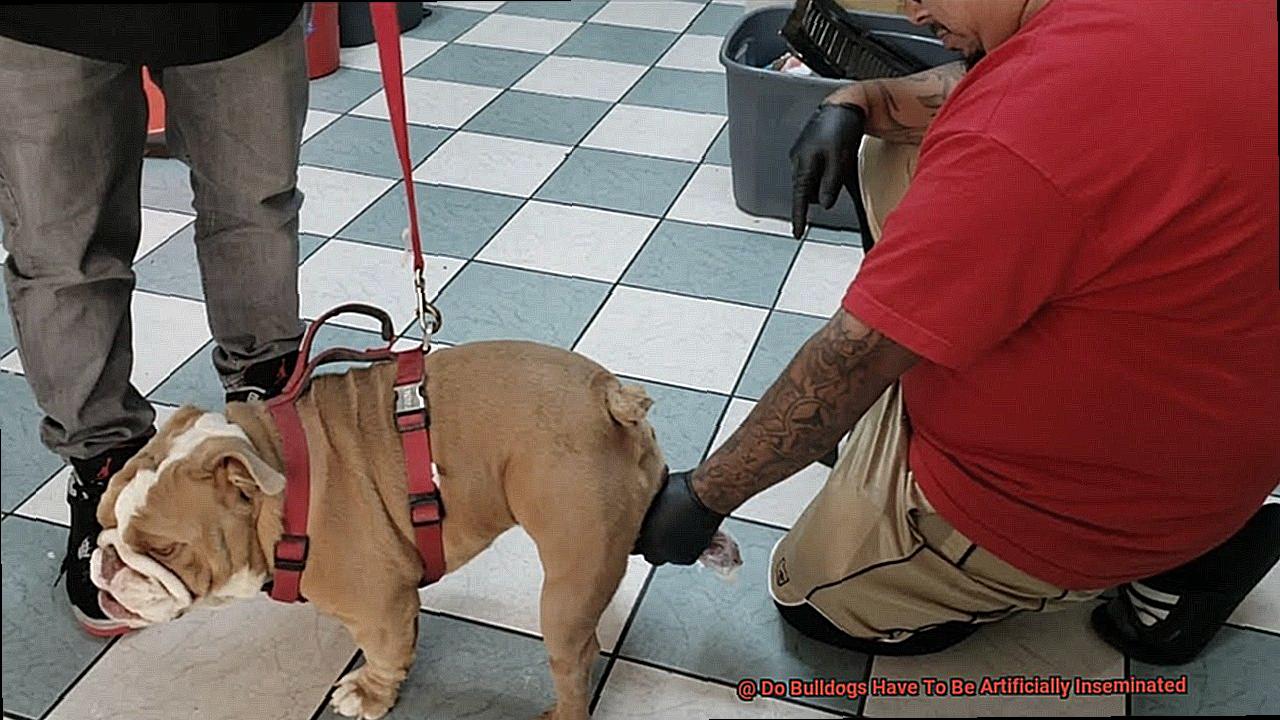
Stocky Build and Broad Chest:
Bulldogs boast a powerful appearance with their stocky build and broad chest. While this adds to their charm, it can also make natural mating challenging. The size and shape of their bodies may hinder them from physically mounting and breeding with a female dog.
Narrow Hips and Short Tail Set:
Another aspect of the Bulldog’s physical structure that affects their reproductive abilities is their narrow hips and short tail set. These characteristics further hinder their ability to naturally mate.
Hip Dysplasia Woes:
Unfortunately, Bulldogs are prone to hip dysplasia, an abnormal formation of the hip socket that causes discomfort during breeding attempts. To avoid exacerbating this condition or causing injury during natural mating, many breeders opt for artificial insemination instead.
Challenges Associated with Natural Breeding in Bulldogs
French Bulldogs are beloved pets known for their distinctive appearance and friendly personalities. However, their unique anatomy and physiology can present challenges when it comes to natural breeding. In this article, we will explore the various obstacles faced by French Bulldogs during natural breeding and discuss how breeders can overcome these challenges.
Anatomy and Physiology:
French Bulldogs have a compact body structure with a large head, short muzzle, and narrow hips. These physical traits can make it difficult for them to engage in successful natural mating without assistance. Breeders may need to provide support or use breeding aids to facilitate proper alignment and successful mating.
Breathing Difficulties:
Brachycephalic breeds like French Bulldogs have shortened skulls, which affect their respiratory system. This can lead to breathing difficulties, especially during physical exertion such as mating. It is crucial to carefully monitor their breathing during mating attempts to prevent exhaustion or collapse.
Heat Sensitivity:
French Bulldogs are sensitive to heat due to their compromised respiratory system. High temperatures can exacerbate their breathing difficulties and increase the risk of heatstroke. Breeders should plan mating attempts during cooler times of the day or in air-conditioned environments to ensure the safety of both dogs involved.
Lack of Natural Instincts:
Selective breeding practices focused on aesthetic traits rather than reproductive abilities may have diminished French Bulldogs’ natural instincts for mating. Breeders should be prepared to provide guidance and training to encourage successful mating behaviors.
Behavioral Challenges:
Some male French Bulldogs may lack interest or experience difficulty achieving an erection, while females may exhibit unresponsiveness or aggression during mating attempts. Patience, positive reinforcement, and professional guidance can help overcome these behavioral challenges.
Increased Risk of Injuries:
The unique body structure of French Bulldogs makes them more susceptible to injuries during natural breeding attempts. The size difference between males and females, combined with their musculoskeletal limitations, increases the risk of accidental injuries. Close supervision and assistance from breeders are essential to ensure the safety of both dogs involved.
Health Concerns:
French Bulldogs are prone to reproductive disorders such as infertility, hormonal imbalances, and genetic abnormalities. These underlying health conditions can affect their ability to conceive naturally or carry a pregnancy to full term. Breeders should work closely with veterinarians to address any health concerns and explore alternative methods such as artificial insemination if necessary.
What is Artificial Insemination?
Artificial insemination is a reproductive technique that involves introducing sperm into a female dog’s reproductive tract without natural mating. It’s a common method used in various animal species, including dogs, to facilitate breeding and overcome certain reproductive challenges.
The Process:
- Semen Collection: The first step in AI is collecting semen from a male dog. This can be done through manual stimulation or using an artificial vagina.
- Female Dog Evaluation: Before insemination, the female dog undergoes tests and evaluations to ensure she’s in optimal health and ready for breeding.
- Insemination Methods: There are different methods of AI, such as vaginal insemination and transcervical insemination. In some cases, surgical insemination may be necessary.
Benefits for French Bulldog Breeders:
- Overcoming Physical Limitations: French Bulldogs face unique challenges with natural mating due to their compact bodies and shortened skulls. AI allows breeders to bypass these obstacles and increase breeding success rates.
- Preserving Desirable Traits: With AI, breeders can carefully select high-quality semen from males that may not be physically able to mate naturally, preserving desirable traits within the breed.
- Expanding Breeding Opportunities: AI enables breeders to access frozen or chilled semen from dogs located in different parts of the world, expanding the gene pool and introducing new bloodlines into their breeding programs.
Benefits of Artificial Insemination for Bulldogs
In this blog post, we will explore the benefits of AI and how it revolutionizes the breeding process for French Bulldogs. So grab your coffee and let’s dive in.
Overcoming Breeding Challenges:
French Bulldogs possess unique physical characteristics that can pose challenges during natural mating. Their short stature, compact bodies, and flat-faced features make it difficult or even impossible for them to mate naturally. AI provides a solution by bypassing these challenges and allowing breeders to select suitable mates without limitations.
Injury-Free Mating:
Brachycephalic breeds like French Bulldogs are prone to respiratory distress and overheating. Physical exertion during natural mating can strain their already compromised respiratory systems, leading to health issues. AI eliminates this risk by eliminating physical contact between the male and female Bulldogs, ensuring their safety and well-being.
Timing is Everything:
With AI, breeders have better control over the timing of breeding. By tracking the female Bulldog’s estrous cycle, breeders can determine the optimal time for insemination, increasing the chances of successful fertilization and pregnancy. This also allows for synchronization of multiple matings, essential for managing large breeding programs or coordinating with other breeders.
Disease Prevention and Genetic Screening:
Using frozen or chilled semen from carefully selected and tested sires helps minimize the risk of genetic diseases or infections. AI plays a crucial role in disease prevention and genetic screening, ensuring the overall health and well-being of the French Bulldog population.
Preserving Genetic Marvels:
AI enables breeders to collect, freeze, and store semen from exceptional Bulldogs for future use. This allows them to continue utilizing the genetic traits and characteristics of these exceptional individuals, even after their natural breeding life has ended. It also promotes collaboration and genetic diversity within the breed by sharing genetic material with other breeders.
Selecting the Best Genetic Matches for Bulldogs
Breeding Bulldogs is no easy task, but with careful consideration of genetic matches, breeders can ensure the health and well-being of this beloved breed. In this article, we will explore the factors to consider when selecting the best genetic matches for Bulldogs.
- Health Issues: Bulldogs are prone to certain health problems such as respiratory issues, hip and elbow dysplasia, skin allergies, and eye problems. To reduce the risk of passing on these genetic disorders, it is important to choose breeding pairs that do not have a history of these issues in their lineage.
- Conformation and Physical Traits: Bulldogs have unique physical characteristics that define their appearance. Breeding Bulldogs with good conformation can help maintain these characteristics and prevent the development of structural issues that may affect their mobility and overall health.
- Temperament: Bulldogs are known for their friendly and affectionate nature. It is important to choose breeding pairs that exhibit desirable temperaments to ensure that their offspring will inherit these positive traits.
- Genetic Diversity: Inbreeding or mating closely related dogs can lead to an increased risk of inherited disorders and reduced overall genetic health. By introducing new bloodlines and avoiding excessive line breeding, breeders can help maintain a diverse gene pool in Bulldogs and reduce the risk of inherited disorders.
To ensure the best genetic matches for Bulldogs, it is recommended to consult with veterinary professionals or experienced Bulldog breeders who have extensive knowledge of the breed’s genetics and health issues. Genetic testing can also be valuable in identifying potential health concerns in breeding pairs and making informed decisions about their compatibility.
How Artificial Insemination Improves the Health and Conformation of the Breed
Breeding Bulldogs is like a delicate puzzle, where each piece represents the genetic health, physical traits, temperament, and diversity needed to create a perfect match. In this blog post, we will explore how artificial insemination (AI) can be a game-changer in improving the health and conformation of Bulldogs. Let’s dive in.
Overcoming Physical Limitations:
Bulldogs are known for their stocky build and brachycephalic skull, which can make natural mating challenging. Their short snouts can cause respiratory issues, making physical activity difficult. Additionally, their large heads and muscular bodies can lead to breeding difficulties or injuries. AI allows breeders to bypass these obstacles by depositing semen directly into the female’s reproductive tract, reducing the risks associated with natural mating. This minimizes injuries and stress on the female Bulldog’s body.
Selective Breeding for Excellence:
AI empowers breeders to select high-quality semen from male Bulldogs with desirable traits such as superior health, conformation, and temperament. By carefully choosing males with exceptional qualities, breeders can enhance the overall health and conformation of future generations of Bulldogs. This ensures that each puppy is born with excellent genetic characteristics.
Overcoming Reproductive Challenges:
Certain Bulldogs may face reproductive challenges like low sperm count or motility, anatomical abnormalities, or behavioral issues. AI techniques like intrauterine insemination (IUI) or intracytoplasmic sperm injection (ICSI) help breeders overcome these obstacles. These techniques increase the chances of successful fertilization and contribute to the overall health of the breed.
Enhancing Genetic Diversity:
Bulldogs have a limited gene pool due to their unique conformation and health issues. This limited diversity can result in a higher prevalence of hereditary diseases. AI provides breeders with the opportunity to access semen from Bulldogs outside their immediate breeding pool, introducing new genetic material and reducing the risk of inherited diseases. This promotes the long-term health and well-being of the breed by diversifying its gene pool.
When Is Natural Breeding Possible in Bulldogs?
If you’re wondering when natural breeding is possible in Bulldogs, you’ve come to the right place. Bulldogs, including our adorable French Bulldogs, are known for their unique physical characteristics. These features can sometimes make natural breeding a bit tricky. But fear not. In this guide, we’ll explore when natural breeding is possible and provide expert tips to help you navigate the world of Bulldog reproduction.
Selecting the Right Mate:
When it comes to natural breeding in Bulldogs, it’s essential to carefully select mates who have compatible physical traits. Some Bulldogs have less severe brachycephalic features or respiratory issues, making them more suitable for natural mating. So, take your time in finding the perfect match for your Bulldog buddy.
Professional Supervision:
In some cases, breeders or veterinarians can lend a helping hand in facilitating natural breeding. With their expertise and guidance, they can overcome any physical limitations that may arise during mating. So, don’t be afraid to seek professional supervision to ensure a smooth and successful breeding process.
Artificial Assistance:
If natural breeding poses risks to the health of the dogs involved, artificial assistance can come to the rescue. Techniques like artificial insemination or surgical intervention can ensure successful reproduction without compromising the well-being of our beloved Bulldogs. Remember, it’s all about putting their health first.
Conclusion:
In conclusion, while natural breeding may present challenges for Bulldogs due to their unique physical characteristics, there are instances where it is possible. By carefully selecting mates, seeking professional supervision, or utilizing artificial assistance when necessary, we can increase the chances of successful natural breeding.
Remember, consulting with veterinarians or reproductive specialists who have experience working with Bulldogs is crucial for making informed decisions regarding breeding methods. They’ll be able to provide tailored guidance based on your Bulldog’s specific needs and limitations.
Consulting a Veterinarian Experienced in Bulldog Reproduction
Let’s take a closer look at why consulting an experienced veterinarian is crucial for ensuring successful breeding outcomes.
Understanding Unique Reproductive Challenges:
Bulldogs face specific reproductive difficulties due to their body structure. Natural mating can be challenging for both males and females. Male bulldogs may struggle to mount the female properly due to their short and stocky build. On the other hand, females often have narrow and tightly folded vulvas, making it difficult for the male to successfully penetrate. These challenges often necessitate the use of artificial insemination as a more reliable and successful method of breeding bulldogs.
Assessing Health and Fertility:
An experienced veterinarian will thoroughly assess the health and fertility of both the male and female bulldogs. They will conduct comprehensive examinations, including assessing the male’s semen quality and the female’s reproductive system. This evaluation helps identify any underlying issues that may hinder successful breeding.
Recommending Hormonal Treatments or Surgical Interventions:
In some cases, hormonal treatments or surgical interventions may be recommended by the veterinarian to improve the chances of successful breeding. These interventions can help address specific reproductive challenges and increase the likelihood of a healthy pregnancy.
Guiding Through Artificial Insemination Process:
A knowledgeable veterinarian will provide guidance throughout the artificial insemination process. They will explain the different methods available and help owners choose the most suitable option based on their specific circumstances. Detailed instructions on collecting and storing semen, as well as the process of inseminating the female, will be provided. Regular follow-up appointments with the veterinarian are crucial during this time to monitor the progress of the pregnancy and address any potential complications that may arise.
By consulting a veterinarian experienced in bulldog reproduction, French bulldog owners can ensure that they are taking the necessary steps to prioritize the health and well-being of their dogs. With their specialized knowledge and expertise, these veterinarians can guide owners through the breeding process, increasing the chances of successful reproduction while minimizing potential risks and complications. So, don’t hesitate to reach out to a professional in bulldog reproduction to ensure the best outcomes for your beloved French bulldogs.
SzdXobaWtfg” >
Conclusion
In conclusion, Bulldogs often require artificial insemination to successfully reproduce.
Due to their unique anatomy and health issues, natural breeding can be challenging and even dangerous for both the male and female Bulldogs. Artificial insemination offers a safer and more reliable method of conception for these beloved dogs.
By working with experienced veterinarians and breeders, Bulldog owners can ensure the continuation of this wonderful breed while prioritizing the health and well-being of their furry companions.
